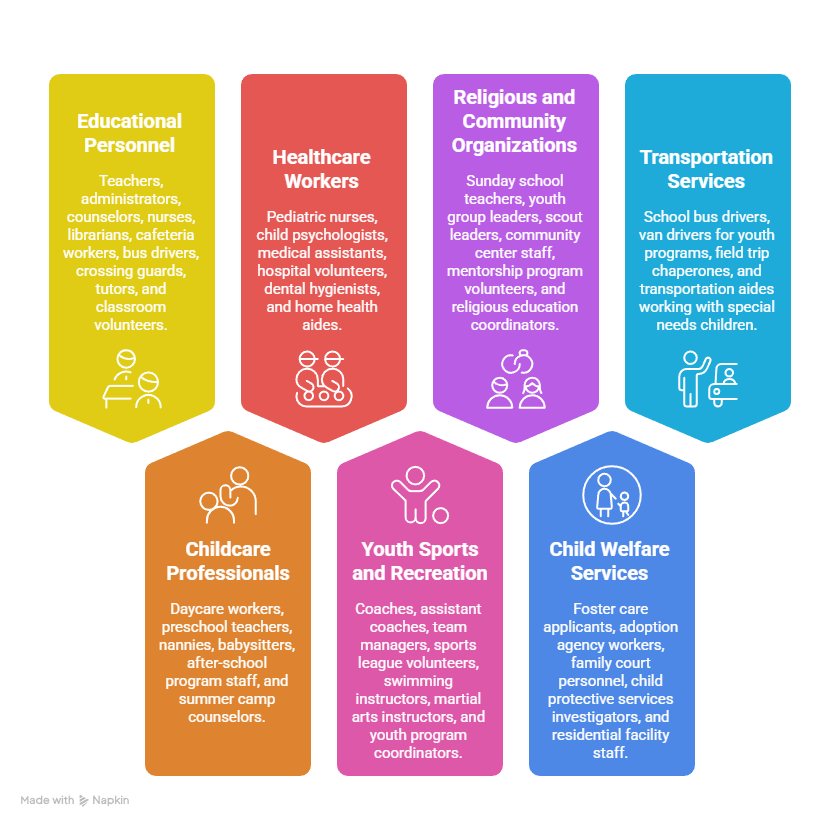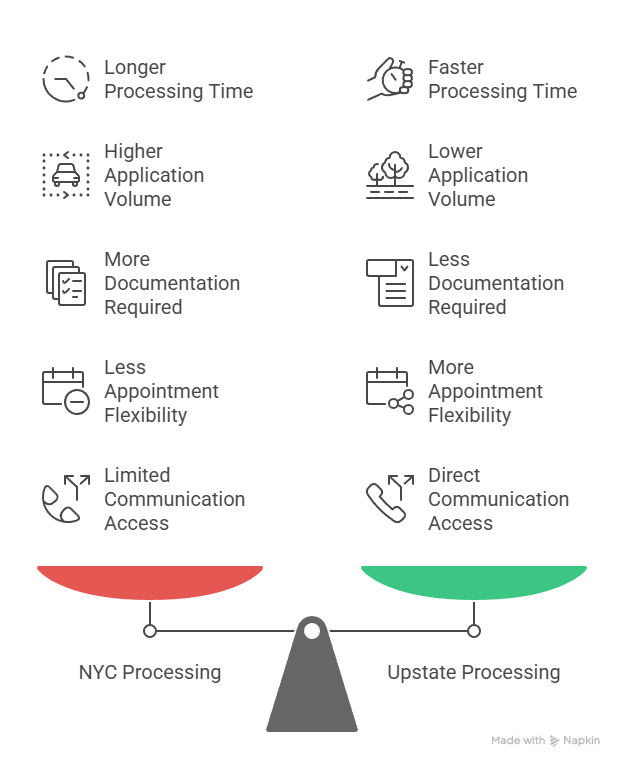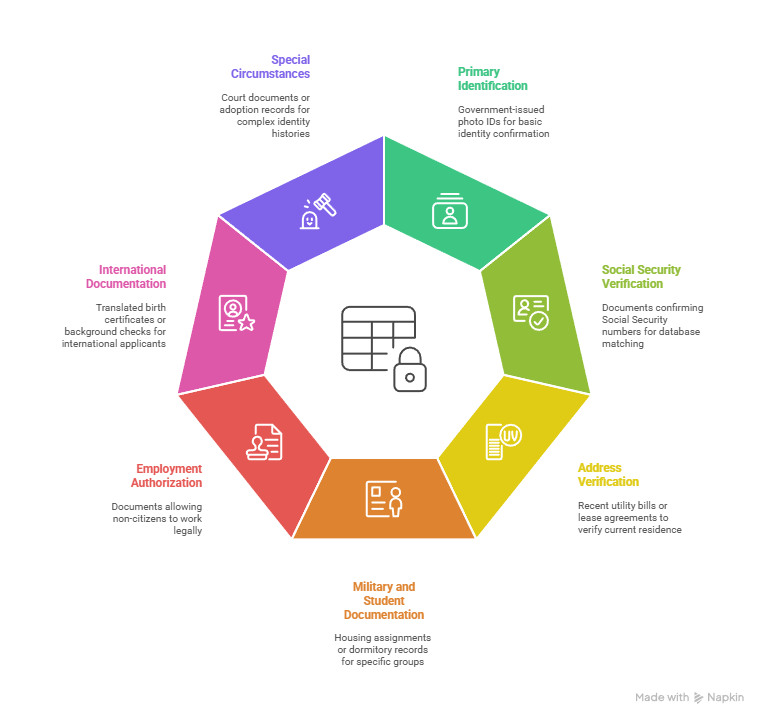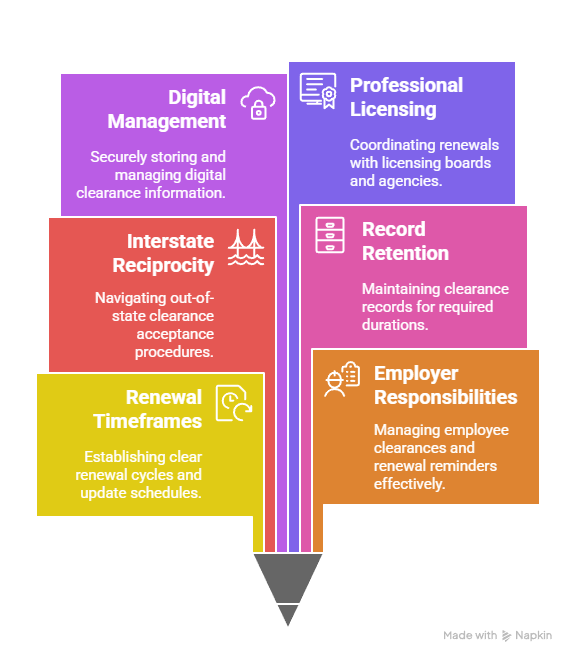New York child abuse clearance requirements vary significantly between NYC and upstate regions, with processing times ranging from 10-45 business days depending on location and application method. Understanding these regional differences and industry-specific requirements is essential for employers, job seekers, and HR professionals navigating the state's child protection screening process.
Key Takeaways
- New York State requires child abuse clearances for all individuals working with children, including teachers, childcare workers, coaches, and volunteers in youth-serving organizations.
- NYC processes clearances through the Administration for Children's Services (ACS), while upstate counties handle applications through local Department of Social Services offices.
- Processing times vary dramatically by region, with NYC applications taking 15-45 business days compared to 10-20 business days in most upstate counties.
- Online applications expedite processing by 30-50% compared to paper submissions, with digital fingerprinting further reducing wait times.
- Healthcare facilities, educational institutions, and licensed childcare centers have specific compliance deadlines that vary by industry and locality.
- Emergency clearances are available in certain circumstances, particularly for essential personnel in educational and healthcare settings.
Understanding New York Child Abuse Clearance Requirements
New York child abuse clearance serves as a critical safeguard protecting children across educational, recreational, and healthcare environments. The NY child abuse clearance system operates through the State Central Register (SCR), which maintains records of indicated child abuse and maltreatment reports throughout the state. This screening process ensures that individuals with substantiated histories of child abuse cannot access positions involving direct contact with minors.
The clearance requirement extends beyond traditional childcare settings to include numerous professional roles. Teachers, school administrators, camp counselors, youth sports coaches, and healthcare workers all fall under mandatory screening provisions. Additionally, volunteers in youth-serving organizations, foster care applicants, and adoption agency workers must obtain valid clearances before beginning their roles. The comprehensive nature of these requirements reflects New York's commitment to child protection across all sectors where minors may be present.
Understanding the distinction between indicated and unfounded reports is crucial for applicants navigating the clearance process. Indicated reports involve credible evidence of abuse or maltreatment, while unfounded reports lack sufficient evidence to substantiate allegations. Only indicated reports appear on clearance documents, though sealed records may still impact employment decisions in certain sensitive positions. The State Central Register maintains these records for varying periods depending on the severity and nature of the allegations, with some records remaining accessible indefinitely for the most serious offenses.
New York's clearance system also incorporates federal background check requirements through FBI databases, creating a comprehensive screening approach that examines both state and national criminal history records. This multi-layered verification process strengthens child protection measures but can also extend processing timelines when federal databases experience delays or technical issues.
Who Needs New York Child Abuse Clearances
New York state law mandates child abuse clearances for a comprehensive range of professionals and volunteers who work with minors in various capacities. The requirement extends beyond traditional childcare roles to include numerous positions where individuals may have direct or indirect contact with children. Understanding these requirements is essential for employers, HR professionals, and job seekers to ensure full compliance with state regulations.

- Educational Personnel: Teachers, substitute teachers, school administrators, guidance counselors, school nurses, librarians, cafeteria workers, bus drivers, crossing guards, tutors, and classroom volunteers
- Childcare Professionals: Daycare workers, preschool teachers, nannies, babysitters working through agencies, after-school program staff, and summer camp counselors
- Healthcare Workers: Pediatric nurses, child psychologists, medical assistants in pediatric offices, hospital volunteers in children's units, dental hygienists treating minors, and home health aides serving families with children
- Youth Sports and Recreation: Coaches, assistant coaches, team managers, sports league volunteers, swimming instructors, martial arts instructors, and youth program coordinators
- Religious and Community Organizations: Sunday school teachers, youth group leaders, scout leaders, community center staff, mentorship program volunteers, and religious education coordinators
- Child Welfare Services: Foster care applicants, adoption agency workers, family court personnel, child protective services investigators, and residential facility staff
- Transportation Services: School bus drivers, van drivers for youth programs, field trip chaperones, and transportation aides working with special needs children
The scope of required clearances continues to expand as New York strengthens child protection measures across all sectors. Even positions with minimal direct child contact may require clearances if the role involves access to areas where children are present, making it crucial for organizations to conduct thorough assessments of their staffing needs and compliance obligations. Recent legislative updates have extended requirements to include technology support staff in schools, maintenance workers in youth facilities, and contracted service providers who regularly access child-serving locations.
NYC vs. Upstate Processing: Key Differences

New York City Processing Through ACS
New York City maintains a separate child abuse clearance system administered by the Administration for Children's Services (ACS). Applications submitted within the five boroughs require specific ACS forms and follow unique processing protocols that differ significantly from upstate procedures. The NYC system typically experiences higher volume due to the dense population and numerous child-serving organizations, resulting in extended processing timeframes ranging from 15 to 45 business days for standard applications.
ACS applications require additional documentation compared to upstate submissions, including enhanced identity verification and supplementary background information. Digital fingerprinting appointments in NYC often have longer wait times, particularly during peak hiring seasons for educational institutions and summer programs. However, expedited processing options are available for emergency hires in essential services, reducing wait times to 5-10 business days with proper justification and additional fees.
The complexity of NYC's system stems from its integration with multiple city agencies and the need to coordinate with federal databases for comprehensive screening. This multi-agency approach provides thorough vetting but can create bottlenecks when any component of the system experiences delays or technical difficulties.
Upstate County Processing Systems
Counties outside NYC process New York childcare worker background check applications through local Department of Social Services offices, creating a decentralized network that often operates more efficiently than the centralized NYC system. This approach typically results in faster processing times, usually 10-20 business days for complete applications, with rural counties frequently processing applications even more quickly due to lower submission volumes and streamlined local procedures.
Upstate processing offers several operational advantages including more flexible appointment scheduling for fingerprinting services and direct communication with local processing staff who can address specific questions or concerns. Many counties provide online status tracking systems, allowing applicants to monitor their clearance progress in real-time through secure portals that update automatically as applications move through various review stages.
Additionally, upstate offices often accommodate urgent requests more readily, particularly for seasonal employment in summer camps and recreational programs that are vital to local economies. The smaller scale of operations allows for more personalized service and faster resolution of application issues that might cause significant delays in higher-volume processing centers.
Industry-Specific Requirements and Timelines
Educational Institution Requirements
Schools and educational facilities operate under strict compliance deadlines for NY childcare worker background check completion, with regulations varying between public, private, and charter institutions. New hires must submit clearance applications within 10 business days of employment offers, with temporary conditional employment permitted pending results in most districts. Substitute teachers and long-term substitutes require full clearances before assignment to classroom positions, though emergency provisions may allow limited exceptions during critical staffing shortages.
Private schools often maintain more stringent requirements than public institutions, requiring additional reference checks and supplementary screening procedures that may include psychological evaluations or extensive interview processes. Charter schools follow public school guidelines but may impose additional local requirements based on their authorizing agreements with state or local education agencies. Summer school programs typically require clearance completion 30 days before program commencement to ensure adequate processing time.
| Institution Type | Application Deadline | Conditional Employment | Processing Priority |
| Public Schools | 10 days post-offer | Yes, up to 60 days | Standard |
| Private Schools | 5 days post-offer | Limited circumstances | Expedited available |
Educational institutions must maintain current clearance records for all personnel and ensure renewals occur before expiration dates, with many districts implementing automated tracking systems to prevent compliance lapses. The consequences of expired clearances can include immediate suspension from duties and potential legal liability for districts that fail to maintain proper oversight of their clearance programs.
Healthcare and Medical Facilities
Healthcare facilities serving pediatric populations require New York child abuse clearance for numerous positions beyond direct patient care roles, recognizing that child safety depends on screening all individuals with potential access to vulnerable patients. Medical assistants, administrative staff with patient access, maintenance personnel, and food service workers all fall under screening requirements when working in pediatric units or children's hospitals.
Processing priorities for healthcare workers often receive expedited handling, particularly during staffing shortages or emergency situations that could compromise patient care. Many hospitals coordinate directly with processing agencies to streamline clearance procedures for essential personnel, sometimes establishing dedicated processing channels that bypass standard queuing systems. Travel nurses and temporary healthcare workers may utilize reciprocity agreements with other states, though New York-specific clearances remain the preferred standard for most facilities.
Long-term care facilities with pediatric services maintain unique requirements, often combining child abuse clearances with elder abuse screenings for comprehensive staff vetting that addresses all vulnerable populations served. Home healthcare agencies serving families with children require clearances for all personnel entering client homes, regardless of direct child interaction likelihood, recognizing that home environments present unique safety considerations that institutional settings may not encounter.
Application Process and Timeline Optimization
Online vs. Paper Application Methods
Digital submission methods significantly reduce processing timeframes for New York child abuse clearance applications, with online applications typically processing 30-50% faster than paper submissions. The choice between application methods impacts not only processing speed but also convenience, cost, and tracking capabilities throughout the clearance process.
| Application Feature | Online Method | Paper Method |
| Processing Time | 10-30 business days | 15-45 business days |
| Payment Processing | Immediate electronic | 3-5 days mail processing |
| Application Tracking | Real-time status updates | Phone/email inquiries only |
| Error Prevention | Automated validation | Manual review required |
| Accessibility | 24/7 availability | Business hours only |
| Cost | Often $5-10 less | Standard fees apply |
| Required Technology | Internet access needed | None required |
While paper applications remain necessary for individuals without reliable internet access or those requiring special accommodations, most applicants benefit significantly from online submission. The digital system provides immediate confirmation, automated notifications, and comprehensive tracking that helps employers and job seekers plan more effectively around clearance completion timelines.
Expedited Processing Options
Emergency clearances are available for essential personnel in critical situations, reducing standard processing times to 5-10 business days when circumstances justify urgent handling. The availability of expedited processing varies by jurisdiction, with some counties offering more flexible emergency provisions than others based on local resources and processing capacity.
Qualifying circumstances for expedited processing include:
- Educational emergencies: Sudden teacher shortages or unexpected enrollment increases requiring immediate staffing solutions to maintain educational continuity.
- Healthcare staffing crises: Critical shortages in pediatric units or emergency departments serving children that could compromise patient safety or care quality.
- Child protection services: Foster care placements requiring immediate background verification for emergency caregivers when children need urgent placement.
- Public safety roles: School security personnel or emergency response team members with child interaction responsibilities during crisis situations.
Expedited applications require supervisor verification and detailed justification for urgent processing needs, with supporting documentation that clearly demonstrates the emergency nature of the request. Additional fees typically apply, ranging from $25-75 depending on processing urgency and jurisdiction, though some counties waive expedited fees for genuine public safety emergencies. Organizations should maintain relationships with processing agencies to facilitate emergency clearance requests when necessary, as established communication channels can significantly accelerate approval processes during urgent situations.
Documentation Requirements and Common Mistakes
Required Documentation and Identity Verification

Successful New York child abuse clearance applications require specific documentation that varies slightly between NYC and upstate processing centers. Primary identification documents must include government-issued photo identification such as driver's licenses, state ID cards, or passports, with photocopies generally acceptable for paper applications while online submissions may require digital uploads. Social Security cards or other documents containing Social Security numbers are mandatory for identity verification and database matching purposes.
Address verification presents common challenges for applicants, particularly those who have moved frequently or maintain temporary housing arrangements. Utility bills, lease agreements, or bank statements dated within 30 days typically satisfy address verification requirements, though some jurisdictions accept alternative documentation for individuals experiencing housing instability. Military personnel and college students may submit base housing assignments or dormitory documentation when traditional address verification proves difficult to obtain.
Employment authorization documents are required for non-citizen applicants, including permanent resident cards, employment authorization documents, or valid work visas with appropriate endorsements. International applicants may need additional documentation such as translated birth certificates or foreign background checks, depending on their country of origin and length of U.S. residence. Processing times for applications requiring international verification can extend significantly beyond standard timeframes, sometimes reaching 60-90 days for complete review.
Fingerprinting Requirements and Quality Standards
Digital fingerprinting has become the standard for New York child abuse clearance applications, replacing older ink-and-roll methods that frequently produced inadequate quality prints requiring resubmission. Fingerprinting appointments must be scheduled at authorized locations that maintain proper equipment and trained technicians capable of producing FBI-quality prints suitable for database matching.
Common fingerprinting issues that delay processing include:
- Poor print quality: Dry skin, cuts, or occupational wear can prevent clear fingerprint capture, requiring multiple attempts or alternative capture methods.
- Technical equipment problems: Malfunctioning scanners or connectivity issues can corrupt digital submissions, necessitating repeat appointments.
- Incomplete submissions: Missing fingers or partial prints due to rushed appointments often result in rejection and resubmission requirements.
- Identity verification problems: Discrepancies between fingerprint appointments and application information can trigger additional verification steps.
Applicants can improve fingerprinting success by moisturizing hands before appointments, avoiding heavy hand use immediately prior to printing, and allowing adequate time for careful capture of all required prints. Some locations offer moisturizing products and hand care instructions to optimize print quality, particularly important for individuals in occupations that may cause skin damage or dryness.
Common Processing Delays and Solutions
New York child abuse clearance applications can experience various delays that extend processing times beyond standard estimates. Understanding these common obstacles helps applicants and employers proactively address potential issues before they impact employment timelines. Proper preparation and early submission remain the most effective strategies for avoiding processing complications.
- Documentation Issues: Name discrepancies between application forms and identification documents, incomplete address histories spanning multiple years, and missing fingerprint quality standards that meet FBI database requirements
- Seasonal Backlogs: Processing delays during peak hiring seasons, particularly summer months for camp and seasonal positions, creating system-wide delays affecting all applicant categories
- Technical Problems: Fingerprinting equipment malfunctions or database connectivity issues in high-volume processing centers where equipment failures affect numerous applicants simultaneously
- Federal Database Delays: FBI system high volume or technical difficulties that extend processing times beyond state and local agency control
- Incomplete Applications: Missing signatures, incorrect personal information, or insufficient supporting documentation triggering additional verification procedures
- Quality Control Issues: Rejected fingerprints requiring resubmission, blurred identification documents, or illegible handwriting on paper applications
Proactive planning significantly reduces the impact of these common delays on employment schedules. Applicants should schedule fingerprinting appointments with adequate buffer time, typically allowing an additional 10-15 business days beyond estimated processing times, and maintain regular communication with employers about potential timeline changes.
Compliance and Renewal Requirements
New York child abuse clearances operate under strict renewal schedules that vary by industry and position type. Organizations must maintain current clearances for all personnel to ensure continuous compliance with state regulations. Understanding renewal requirements prevents employment disruptions and regulatory violations that can impact both individual careers and organizational operations.

- Renewal Timeframes: Three-year renewal cycles for most positions, with annual updates required in healthcare facilities and pediatric intensive care units
- Employer Responsibilities: Tracking employee clearance expiration dates, implementing automated reminder systems, and ensuring timely renewal submissions
- Interstate Reciprocity: Limited acceptance of out-of-state clearances with specific approval processes varying by jurisdiction and employment type
- Record Retention: Maintaining clearance documentation for three to seven years following employment termination, depending on industry regulations
- Digital Management: Implementing secure storage procedures for confidential background information while ensuring accessibility for compliance audits
- Professional Licensing: Industry-specific renewal requirements coordinated with professional licensing boards and regulatory agencies
Automated tracking systems have become essential for organizations managing multiple employee clearances, generating renewal reminders 90 days before expiration dates to allow adequate processing time. Failure to maintain current clearances can result in immediate employment suspension and potential regulatory violations that may trigger investigations or penalties affecting organizational reputation and compliance standing.Add to Conversation
Conclusion
Successfully navigating New York child abuse clearance requirements demands understanding of regional processing differences, industry-specific timelines, and optimization strategies for various application methods. Whether working in NYC's complex ACS system or upstate county offices, applicants benefit from early submission, complete documentation, and strategic use of expedited processing when necessary. Organizations serving children must prioritize compliance through systematic tracking and renewal procedures, ensuring continuous protection for vulnerable populations while maintaining operational efficiency. The investment in proper clearance procedures ultimately strengthens child safety across all sectors while supporting legitimate employment opportunities for qualified professionals.
Frequently Asked Questions
How long does a New York child abuse clearance take to process?
Processing times vary by region and application method. NYC applications through ACS typically take 15-45 business days, while upstate counties process applications in 10-20 business days. Online submissions process 30-50% faster than paper applications.
What's the difference between NYC and upstate New York clearance processing?Â
NYC uses the Administration for Children's Services (ACS) system with longer processing times and additional documentation requirements. Upstate counties process applications through local Department of Social Services offices, typically offering faster turnaround times and more flexible scheduling.
Who needs a New York child abuse clearance?Â
Anyone working with children requires clearance, including teachers, childcare workers, coaches, camp counselors, healthcare workers in pediatric settings, school volunteers, and youth organization staff members.
Can I work while waiting for my clearance to process?Â
Many employers offer conditional employment pending clearance completion, particularly in educational settings. However, this varies by industry and employer policy. Healthcare and licensed childcare facilities may have stricter requirements.
How much does a New York child abuse clearance cost?Â
Standard processing fees typically range from $25-50, with expedited processing costing an additional $25-75. Fees vary by county and processing method, with online applications sometimes offering slight cost savings.
Do New York child abuse clearances expire?Â
Yes, clearances require renewal every three years for most positions. Some healthcare facilities and educational institutions may require more frequent renewals. Employers must track expiration dates to ensure continuous compliance.
What happens if something appears on my child abuse clearance?Â
Only "indicated" reports (substantiated allegations) appear on clearances. If you have an indicated report, you may still be eligible for certain positions depending on the nature of the incident and employer policies. You have the right to appeal or request record correction if you believe the information is inaccurate.
Can I use an out-of-state child abuse clearance in New York?Â
Limited reciprocity agreements exist with certain states, but New York-specific clearances are generally required. Professional licensing boards may have specific reciprocity provisions for their industries. Check with your employer and relevant licensing authority for specific requirements.
Additional Resources
- New York State Office of Children and Family Services - Child Abuse Clearance Information
https://ocfs.ny.gov/programs/cps/ - NYC Administration for Children's Services - Background Check Requirements
https://www.nyc.gov/site/acs/about/background-checks.page - New York State Education Department - School Personnel Background Check Requirements
http://www.nysed.gov/school-personnel-review-and-accountability/background-checks - Department of Health - Healthcare Worker Background Check Guidelines
https://www.health.ny.gov/professionals/ - New York State Central Register - SCR Clearance Process
https://ocfs.ny.gov/programs/cps/scr-clearance/

GCheck Editorial Team
Meet the GCheck Editorial Team, your trusted source for insightful and up-to-date information in the world of employment background checks. Committed to delivering the latest trends, best practices, and industry insights, our team is dedicated to keeping you informed.
With a passion for ensuring accuracy, compliance, and efficiency in background screening, we are your go-to experts in the field. Stay tuned for our comprehensive articles, guides, and analysis, designed to empower businesses and individuals with the knowledge they need to make informed decisions.
At GCheck, we're here to guide you through the complexities of background checks, every step of the way.






